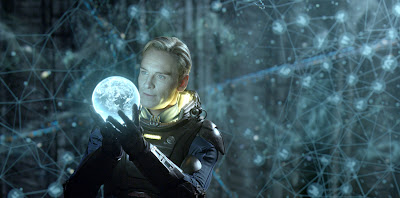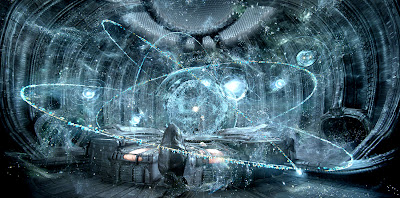Prometheus, the
long-awaited quasi-canon Alien
prequel, does not answer the questions Alien
fans have been asking since 1979, nor does it acknowledge the fact that they've been asked at all.
It does, however, veer off on its own to ponder grander bits of the cosmos.
Like Ferdinand the Bull, why should Prometheus
gore spectators when it can be smelling the flowers?
For those interested in those sorts of scenes: fear not, there is
gore, enough to make you re-appreciate John Hurt’s post-coma snack from Alien, but these scenes are framed
within a larger idea, one that hints at the very origins of life on this planet
and others.
What’s especially refreshing about Prometheus is the way it fuses laboratory and chapel together in
this theo-scientific mash-up of chest-bursting hyphenation. The main character,
daughter of a Christian missionary, is searching for a creator, or maybe the Creator.
When she finds a humanoid alien species on a foreign planet, a colleague suggests
that her God doesn’t exist after all. “But then who created them?” she asks
pointing at the alien discovery. Religion is so often posed against science,
and science against religion, but those formulas neglect to include the people
who can’t answer to one without the other. Surely before the Big Bang there was
a Bigger Bang, right?
These broader questions are surprising here, especially coming
from Alien, a straightforward sci-fi
horror-thriller, about an acid-blooded creature turned loose on a killing spree
within the claustrophobic steam-blown halls of a space freighter. There was a
great deal of subtext in that film — gender roles, rape fear, technology — but
for the most part it was a monster movie, maybe the ultimate monster movie. Prometheus aspires to be something
entirely different, and achieves that.
The movie takes place roughly 50 years before Alien. Research vessel Prometheus has
landed on a rocky world outside of our solar system. Its crew, geeky scientists and craggy terraformers, have been guided here by star maps found within ruins on Earth.
On the uncharted planet they discover an ancient civilization of alien
humanoids — they’re “alien,” as in foreign, not “alien” as in the xenomorphs
from the previous movie — and what appears to be a science lab where they were
engineering life, or maybe death.
Leading the research team is Dr. Elizabeth Shaw (Noomi Rapace),
though she holds little power compared to Prometheus captain Janek (Idris Elba)
or icy Weyland Corporation honcho Vickers (Charlize Theron). Vickers is so cold
and impassive her crew thinks she might be an artificial intelligence in a
human construct, like robot crewmember David (Michael Fassbender), who has
modeled his mannerisms from Peter O’Toole in Lawrence of Arabia.
Horror oozes into the seams of the rather straightforward sci-fi movie
after Shaw and her team discover the Engineers’ elaborate storage chambers,
filled with stone jars containing some kind of creature, virus or biological
technology. As they venture deeper into the ruins, they find fresh horrors:
fossilized humanoid bodies, morphing wall murals and Alien’s famous “space jockey” riding his macabre gun-throne. How
all this does or does not fit into the Alien
legacy is something I will let you discover, but I’m not entirely sure the
movie will have all the answers. It’s ambitiously ambiguous to the point of
hair-pulling frustration.
Oh, and the plot holes. There are many. Too many for a movie this
rich in detail, wonder and scope. For instance, why does a crewmember attack
his teammates? Why does a whirling probe device bing back results after parking
itself outside a suspicious door? Why did the Engineers carve xenomorphs into
their wall art? Why did the humanoids all die, except for one in a hibernation
pod? Why did the contents of the stone jars have three different effects on
three different characters? And the most asinine plot hole: how could two
characters get lost in a labyrinthine temple when they had a 3D map of the
temple itself? I was disappointed that many of these details weren’t clarified.
It’s as if Prometheus was trying to
juggle too many elements and there was a banana peel on the stage.
All that aside, though, Prometheus
has good bones and I think most viewers will do what I did and forgive the
reckless story elements that mar the otherwise solid plot. After all, the film
looks wonderful, including shots of Prometheus hovering down onto a world with
an entire other planet filling the skies above it. The set design is top-notch,
with lots of neat space technology and ship designs that are juxtaposed against
new H.R. Giger-designed sets made of sinew and spines. And the actors are
wonderful, especially Rapace and Fassbender. She plays with too much emotion
and he plays with none at all, and the balance is perfect.
It is directed by futurist visioneer Ridley Scott, whose Alien and Blade Runner are sci-fi royalty. In Prometheus Scott romanticizes space and exploration, though tints
of Alien’s blue-collar grittiness are
not far off — remember, this is a prequel of sorts. His work here also makes me
think of westerns, which has never been a stretch for science fiction. Both
genres thrive off that great void outside the window. In westerns the void is
the desert, but here it’s space, the ultimate abyss, where a man, woman or entire
civilization can find its soul and lose it again without bumping into anything.
There’s an inherent loneliness to films like this, which further validates the importance of the Shaw character: her ultimate science-and-religion quest is to discover if humans are alone in the universe or if a higher power is at work here, which is she so willfully dons a spacesuit to dance at the mouth of madness. For her, the loneliness will end with a larger discovery.
Audiences will go to Prometheus
hoping to find aliens. Like Dr. Shaw, they will discover so much more.










